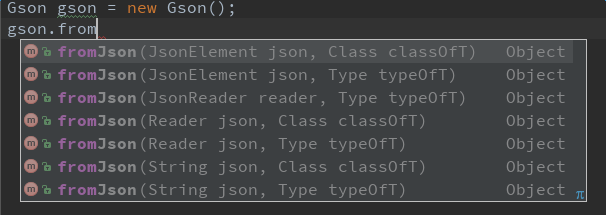@act262
2017-03-24T03:26:43.000000Z
字数 1396
阅读 2600
Gson Java 泛型解析
Gson

定义的一些类:
// 普通对象class CustomObj {int id;String name;}// 带泛型的对象class GenericObj<T> {int id;T data;}
1.处理一般的对象:
CustomObj obj = gson.fromJson(jsonContent,CustomObj.class);
2.处理带泛型的对象:
带泛型的模型一般用匿名内部类的形式创建TypeToken,从而获取到带泛型参数的Type用于gson解析
Type type = new TypeToken<GenericObj<String>>() {}.getType()GenericObj<String> o = gson.fromJson(jsonContent, type)
可以将方法1中的class转换为Type,然后流程和方法2是一样的,没必要.
Type type = new TypeToken<CustomObj>() {}.getType()CustomObj obj = gson.fromJson(jsonContent,type);
TypeToken作用:
使用Java的泛型功能时,因为泛型的擦除机制,所以在运行时不能知道泛型的具体类型是什么,TypeToken就是用来保留这个泛型信息的.
// 泛型的真实类型final Class<? super T> rawType;// 使用泛型的那个类final Type type;final int hashCode;
protected TypeToken() {this.type = getSuperclassTypeParameter(getClass());this.rawType = (Class<? super T>) $Gson$Types.getRawType(type);this.hashCode = type.hashCode();}static Type getSuperclassTypeParameter(Class<?> subclass) {// 这里指代的是TypeToken<T>这个类Type superclass = subclass.getGenericSuperclass();if (superclass instanceof Class) {throw new RuntimeException("Missing type parameter.");}ParameterizedType parameterized = (ParameterizedType) superclass;return $Gson$Types.canonicalize(parameterized.getActualTypeArguments()[0]);}
使用JsonDeserializer的泛型参数
JsonDeserializer deserializer = xxx;Type ifGenericType = deserializer.getClass().getGenericInterfaces()[0];ParameterizedType parameterizedType = (ParameterizedType) ifGenericType;Type type = $Gson$Types.canonicalize(parameterizedType.getActualTypeArguments()[0]);
